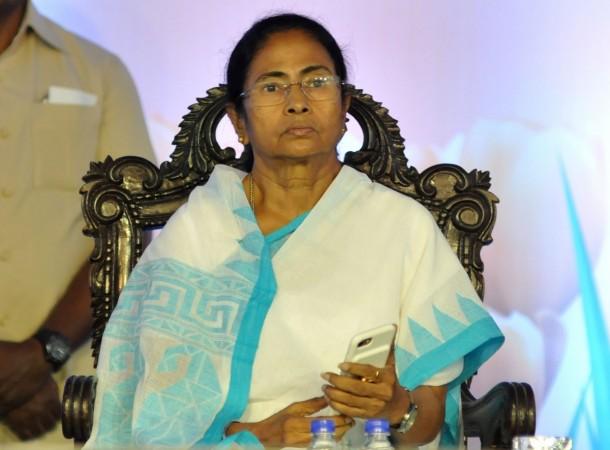
One year is a long time in politics.
West Bengal Chief Minister and Trinamool Congress supremo Mamata Banerjee had an ugly fallout with the Ananda Bazaar Patrika (ABP) Group ahead of and during the assembly elections in West Bengal last year.
While Banerjee led her party to victory, against the odds — including the serious accusations of accepting bribes against her party leaders — the media house ran a campaign that many felt was biased against her government and favouring the Left Front-Congress tie-up.
Informed quarters cite the reason for the fall-out as a dispute over a land in Kolkata: a conflict of interest over leasing a piece of land on Kolkata's Eastern Metropolitan Bypass in 2014.
The media house carried its anti-Banerjee 'crusade' throughout the election though it was the TMC chief who had the last laugh as her party won 211 out of 294 seats in the Assembly.
Even prior to that, after the TMC came to power for the first time in 2011, the government banned several English and vernacular dailies from over 2,000 libraries in Bengal. Publications from the ABP house were also targetted while those that were loyal to the Banerjee government were given clearance.
Has Mamata let bygones be bygones with ABP?
Fast forward to March 23, 2017, and we saw Banerjee gracing the studio of the same media channel, in a one-on-one with its popular host Suman De.
ABP Group's news channel ABP Ananda rarely sees a TMC leader in the hot seat, relying mainly on a few academics to defend the party during debates against Opposition members. So, has Banerjee forgiven the channel?
Certainly not. Though Mamata spoke in her usual tone, suggesting that she cares very little about the BJP – her biggest opponent now – the content in her speech made it evident that she was under stress.
The loss of face has come from a few quarters: The Supreme Court, where the TMC government lost its challenge on the Calcutta High Court's order for a CBI probe into the Narada sting operation; the rising activities of the RSS in Bengal; the growing presence of the BJP in the state; and the decimation of the 'secular' front in UP in the recent Assembly elections.
The TMC chief chose to befriend the media to test the waters
And hence, she chose her state's biggest media group to work in her favour this time. Banerjee's anti-BJP remarks, made on the show, were a desperate attempt to shore-up support by reaching the maximum number people to present her version of the story.
It was a blend of caution, emotion and counterattack [like she said: "If BJP targets Bengal, we will target India", "The BJP might have won UP, but not the entire India" or "some people from my own party tried to topple me"].
She did the same thing before the 2011 Bengal polls
This ploy, however, has been used before by Banerjee. Prior to her historic victory in the 2011 Assembly elections, when she toppled the Left Front government, which had been in power for 34 years, she often to appear on TV channels, including the one belonging to the ABP Group. That was not the case ahead of the 2016 election though.
It was during one of these interviews that she claimed she would transform Kolkata into London, a remark still discussed among Bengalis living in Bengal and outside when engaging in a jovial conversation.
This year the TMC leader took the same route again, knowing very well what impact TV could have in these challenging times as well. Banerjee has a series of challenges to meet against the BJP over the next few years (2018 panchayat elections, 2019 Lok Sabha elections and 2021 state elections) and with serious allegations of corruption and minority appeasement circling, the TMC supremo is getting increasingly cornered.
The rise and rise of Modi on the national stage has also severely restricted the possibility of her own vertical growth. So, she needs the media more than ever to project the right image of her.
Banerjee's desperate efforts to ally with her former foe, to deal with the current one reeks of hypocrisy.
During the interview, she also backed Srijato Bandyopadhyay, the poet who recently copped flak for writing anti-BJP poetry, while in fact, it was her government who sent a university professor in Kolkata, Ambikesh Mahapatra, to jail for forwarding a cartoon mocking her party's leaders.
Double-speak galore. But that is how India's politicians function, isn't it?












